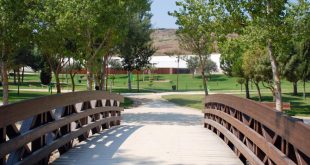ECO123: Is it difficult to live in Monchique or is it easy?
Jeremy: It is easier than it used to be. We were the first foreigners to arrive here. The reception of foreigners is much better than it used to be. Economically it is more difficult nowadays. It means that basically today you have to spend more time working as a percentage of your general time than before. I do gardening and computer work. I first studied electronics in Portimão and then I did a professional course in Faro. When I was younger, electronics was my interest. My father was an electrician for several years and I followed on with that interest in the computer world.
You are working in opposite areas, in agriculture and in IT. How do you make these two things compatible?
It is one or the other. I try to repair things as much as possible instead of throwing them away. I recycle a lot. It’s all about reusing old things.
How do you do that?
Most of what I learnt didn’t come from the course. It was self-taught. The course was only seven months long and it wasn’t as long as I wanted. It didn’t go into the subject in depth. Then I worked in a shop for six months. Then I tried to do IT repairs in our village, but there weren’t enough customers. People always want the latest and most fashionable thing. So, for the moment, I’ve stopped doing this and now I’m unemployed. I mean if I have second-hand parts available I will always suggest replacing faulty parts with second-hand parts. It works out cheaper for the client and better in terms of the environment. But I wasn’t earning enough. I found the benefits of being registered and working were not really enough to compensate for that kind of hassle.
You are unemployed but you don’t receive any money from the government?
No. I didn’t make enough money to pay social security. That would only happen if I had worked for a company and was fired.
How do you live and how do
you want to live?
I have a garden with around 30 crops; potatoes, tomatoes, cucumbers and a lot of other good things. It’s quite small because I’m still starting out. I’ve only been doing it for a few months, and it’s all just for myself. Only if I have some leftovers do I exchange them. And I have a machine for strimming. I clear the land around houses, the 50-metre fire protection, and live from smaller garden jobs. I can survive but not prosper. I live in difficult financial times at the moment like many others. I would need 600 to 700 euros a month to pay tax and social security.
What about the future?
I’m not thinking about that at the moment.
Then let’s talk about the present.
I don’t need a lot for life. We created a time-share system, a time bank in which anybody who wants to participate can exchange a specific individual service; for example babysitting for garden work or potatoes for peas, a loaf of bread for fruit. A specific job I do for someone who participates in the time bank is balanced with a service or goods that she or he is preparing for me or giving to me. No money is involved. At the moment, I’m working as much I can in my own garden. I also barter seeds. I do as much as possible to reuse things, avoid and separate any rubbish, and always refuse plastics in supermarkets. They look at me with funny faces.
You don’t eat meat or fish, no milk and no cheese, right?
I never did. I was lucky to be brought up that way. All my life I’ve lived as a vegan. It was difficult in the early days at school and I had no preparation for that lifestyle with meat. Only in the last three years have the students had access to this diet. I was the first one at the school in Monchique and it was quite difficult.
Do you have an actual example of what could work better?
We need to get rid of the eucalyptus trees because that is the main fuel for the fires we are having, and they’re still planting new eucalyptuses in places that didn’t have that before. It is a shame that Monchique has to go in that direction. Forest fires will destroy tourism as well.
Thank you.
 Eco123 Revista da Economia e Ecologia
Eco123 Revista da Economia e Ecologia

